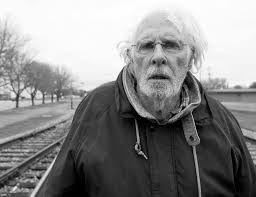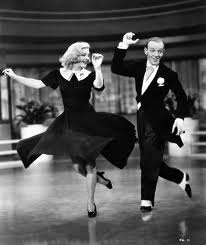United States of Nebraska
 On Imdb, I saw a thread asking if there were really places in the U.S. like Hawthorne, Nebraska, as pictured in Academy Award Best Picture nominee “Nebraska.”
On Imdb, I saw a thread asking if there were really places in the U.S. like Hawthorne, Nebraska, as pictured in Academy Award Best Picture nominee “Nebraska.”
Let me start from the beginning.
“Nebraska” is about an old man named Woody who received a letter in the mail from a company similar to Publishers Clearing House, saying that he was the winner of $1 million. As we all know, and everyone in the movie knows, this is basically a scam to get people to sign up for magazine subscriptions. Woody doesn’t seem to understand this, despite his wife and sons telling him repeatedly it isn’t real. But one of his sons, David, says he’ll drive him from their home in Billings, Montana to Lincoln, Nebraska, where the office is located. He knows his dad is no millionaire, but David is bored of Montana and his job selling stereos at one of those dying home entertainment stores you see in strip malls that you wonder how they stay in business. And he wants to do something nice for his dad and also just get him to shut up, so David decides to take him on the half-day’s drive to Lincoln.
On the way, they stop in Woody’s childhood hometown of Hawthorne. It’s a sleepy little aging farming town that you might pass if you ever take a long road trip, that to you is just one name out of hundreds you’ll pass on the freeway. It might have been a hotspot for industry at some point in its history. Now it’s reduced to the older folks who moved there for the work and then retired, and it’s filled with family diners and the chain restaurants and retail stores that for some reason decided it might be profitable to have a branch there. Their children have all moved away, because they wanted to find a place a bit more lively, except those certain kids who never found their way to college or the military. Mostly nothing happens, but the people there like it that way.

Poor, poor Woody. He’s not a nice guy, and would hate to know someone felt sympathy for him. He still has a sharp wit though. In this scene, he’s gone and lost his teeth again.
When they hear about Woody’s prize, they get excited because mostly nothing ever happens there. Eventually, all the family decides they want to vulture his supposed winnings away from him, though even they probably realize that it’s too good to be true.
But yes, these little towns do exist. Despite what the media and entertainment worlds will have you believe, there is life between New England and LA, and not just Chicago. Maybe that life has a fading pulse, but it’s out there. No, these people don’t care what happens in your big cities. They’re content to know the news around town. Forget MSN and CNN (and the Internet altogether in some places), these folks want to know if the town is going to keep doing leaf collection in the fall. But they might check out the local Fox News station to see if they can mine some material to hound the newspaper about. The most read pages in the paper (yes, they still read newspapers) are the obituaries and police logs. They’re interested in whether anyone they know has died or been arrested.
I know this because I’ve lived in it, and in my road trips, I’ve dropped in on a few these small towns. I currently live in apartments in a college town, where half the population is the students. Most of the businesses where I live are bars and clubs because it’s a college town in the middle of nowhere. There’s also a lot of restaurants. And that’s about all there is. Located next to my apartments is abandoned farm land.
But these small towns do have the most colorful names. Forget Chicago or Philadelphia or Detroit, that’s weak sauce. Check out Horse Cave, Kentucky. That’s a real place. Or New California, Ohio. I wonder how it got that name. Did someone really stop in Ohio and think it reminded them of sunny Cali? They obviously weren’t here in the winter. There’s also Coxsackie, N.Y. I don’t think I want to know why they named it that.
Watch the film. It’s in black and white, which I know is a turn-off to many people, but it really helps capture the dullness and mundaneness of most people’s real lives.
But Bruce Dern’s turn as Woody is pretty awesome. He’s one of those old guys whom you wonder how much of him is even there most of the time, but he’s still got such a sharp wit when you get him to open up.

It’s interesting to see Will Forte do something different. “Nebraska” could never be confused as a companion piece to “MacGruber.”
Will Forte is a revelation as David. I thought his comedy on “SNL” was mostly hit or miss (with emphasis on “miss”). Here, he plays the straight man very convincingly, and this is a good environment for his dry as a drought-addled desert sense of humor. It’s great when he tells his relatives he’s stuck working at the entertainment center because of the recession, and you just know that isn’t true. This is a breakout role for Forte, as he’s moved on from big, commercial, cornball comedy to obscure, indie, boring comedy. But boring in a good way in this case, if that’s even possible. It would have been nice to see him recognized in this awards season, as odd as it feels to type that.
And don’t forget about June Squibb. As Woody’s wife, Kate, she’s the sassy, dirty old lady, whom all the guys wanted back in her day, taken to a whole new level of wit and raunch. It’s truly brilliant, and it’s great to see her recognized with an Oscar nomination this year.
The comedy here is so dry that it might require a beverage to soothe your parched throat as you watch it, but if you enjoy that sort of thing, this is quite a gem director Alexander Payne has farmed up. It’s slow as a day working retail in a small town, and it’s certainly not for everyone. But personally, I think it’s a shame that it came out this year with such strong contenders for Best Picture, and I don’t want to see anything but “12 Years a Slave” take that award this year. I don’t know that this would ever be a winner, but looking at the winners from the last few years, I think it could have topped them.
If you’re truly adventurous, stop in one of these towns sometime and eat at the local diner. Then just drive around town and check out the scenery. It doesn’t matter which town, they’re all basically the same. But you might just come away with a better appreciation for what you have in the big city.
There’s a whole world out there beyond the metropolitan areas. These little places don’t dot the landscape of America’s heartland, they blanket it. The big cities are the real few and far between spots on the map. Does living in a small town really compare to big city living? No, but the people living there like it that way.

















